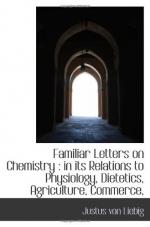The influence which the increase of surface exercises upon the disintegration of rocks, and upon the chemical action of air and moisture, is strikingly illustrated upon a large scale in the operations pursued in the gold-mines of Yaquil, in Chili. These are described in a very interesting manner by Darwin. The rock containing the gold ore is pounded by mills into the finest powder; this is subjected to washing, which separates the lighter particles from the metallic; the gold sinks to the bottom, while a stream of water carries away the lighter earthy parts into ponds, where it subsides to the bottom as mud. When this deposit has gradually filled up the pond, this mud is taken out and piled in heaps, and left exposed to the action of the atmosphere and moisture. The washing completely removes all the soluble part of the disintegrated rock; the insoluble part, moreover, cannot undergo any further change while it is covered with water, and so excluded from the influence of the atmosphere at the bottom of the pond. But being exposed at once to the air and moisture, a powerful chemical action takes place in the whole mass, which becomes indicated by an efflorescence of salts covering the whole surface of the heaps in considerable quantity. After being exposed for two or three years, the mud is again subjected to the same process of washing, and a considerable quantity of gold is obtained, this having been separated by the chemical process of decomposition in the mass. The exposure and washing of the same mud is repeated six or seven times, and at every washing it furnishes a new quantity of gold, although its amount diminishes every time.
Precisely similar is the chemical action which takes place in the soil of our fields; and we accelerate and increase it by the mechanical operations of our agriculture. By these we sever and extend the surface, and endeavour to make every atom of the soil accessible to the action of the carbonic acid and oxygen of the atmosphere. We thus produce a stock of soluble mineral substances, which serves as nourishment to a new generation of plants, materials which are indispensable to their growth and prosperity.
LETTER XIII
My dear Sir,
Having in my last letter spoken of the general principles upon which the science and art of agriculture must be based, let me now direct your attention to some of those particulars between chemistry and agriculture, and demonstrate the impossibility of perfecting the important art of rearing food for man and animals, without a profound knowledge of our science.
All plants cultivated as food require for their healthy sustenance the alkalies and alkaline earths, each in a certain proportion; and in addition to these, the cerealia do not succeed in a soil destitute of silica in a soluble condition. The combinations of this substance found as natural productions, namely, the silicates, differ greatly in the degree of facility with which they undergo decomposition, in consequence of the unequal resistance opposed by their integral parts to the dissolving power of the atmospheric agencies. Thus the granite of Corsica degenerates into a powder in a time which scarcely suffices to deprive the polished granite of Heidelberg of its lustre.




